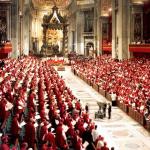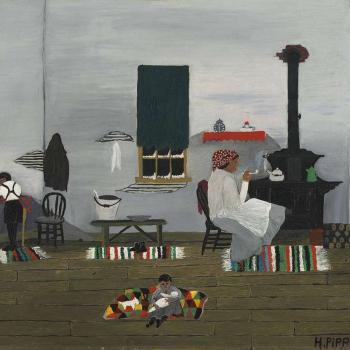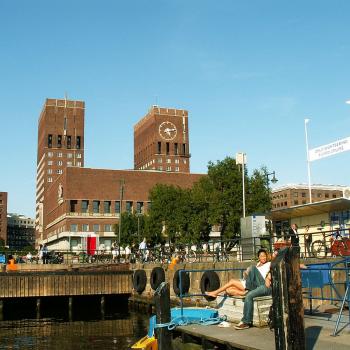We will return to these precise requirements soon enough. I would, however, like to briefly note a recent restatement of these same principles in the woefully-under-read, Oeconomicae et pecuniariae quaestiones. This document was released only last year (2018); it has much to teach us. For example:
Economic activity cannot be sustained in the long run where freedom of initiative cannot thrive.[23]It is also obvious today that the freedom enjoyed by the economic stakeholders, if it is understood as absolute in itself, and removed from its intrinsic reference to the true and the good, creates centers of power that incline towards forms of oligarchy and in the end undermine the very efficiency of the economic system.[24]
From this point of view, it is easy to see how, with the growing and all-pervasive control of powerful parties and vast economic-financial networks, those deputed to exercise political power are often disoriented and rendered powerless by supranational agents and by the volatility of the capital they manage. Those entrusted with political authority find it difficult to fulfil to their original vocation as servants of the common good, and are even transformed into ancillary instruments of interests extraneous to the good.[25]
These factors make all the more imperative a renewed alliance between economic and political agents in order to promote everything that serves the complete development of every human person as well as the society at large and unites demands for solidarity with those of subsidiarity.[26] (Oeconomicae et pecuniariae quaestiones 12)
Here, Pope Francis does not deny the importance of “freedom” in the economic realm. Rather, he builds upon the points made by Pope Leo, giving them more definition, allowing those principles to speak to our moment. He identifies avaricious in elements of our financial system, elements that concentrate private property in smaller and smaller group of people. This would seem to violate the duties sketched by his predecessor. In other words, private property, as Ambrose and Aquinas state, is not made sacred merely by being possessed. How much does one person possess? How did he get it? By what means has he held on to it? How are his workers and customers treated? The need to ask these questions betrays the provisional nature of such property (on the grounds sketched above). Personal property is important; it has a role to play in human flourishing. This does not, however, mean that once one possesses something he has an inalienable right to it.
We might even say that such a person is covetous (as St. Ambrose and Pope Francis imply). Often we think of the poor worker as the envious one, desiring what is not his. But might we not say that the man with much, refusing to give up little, begrudges his neighbor any gain? Might we not say that he is the covetous one who does not wish others to have from that which was ordained for all? Once again, this pope’s recent writing gives us our answer:
Therefore, those whom fortune favors are warned that riches do not bring freedom from sorrow and are of no avail for eternal happiness, but rather are obstacles;(9) that the rich should tremble at the threatenings of Jesus Christ – threatenings so unwonted in the mouth of our Lord(10) – and that a most strict account must be given to the Supreme Judge for all we possess. The chief and most excellent rule for the right use of money is one the heathen philosophers hinted at, but which the Church has traced out clearly, and has not only made known to men’s minds, but has impressed upon their lives. It rests on the principle that it is one thing to have a right to the possession of money and another to have a right to use money as one wills. Private ownership, as we have seen, is the natural right of man, and to exercise that right, especially as members of society, is not only lawful, but absolutely necessary. “It is lawful,” says St. Thomas Aquinas, “for a man to hold private property; and it is also necessary for the carrying on of human existence.”” But if the question be asked: How must one’s possessions be used? – the Church replies without hesitation in the words of the same holy Doctor: “Man should not consider his material possessions as his own, but as common to all, so as to share them without hesitation when others are in need. Whence the Apostle with, ‘Command the rich of this world… to offer with no stint, to apportion largely.’”(12) True, no one is commanded to distribute to others that which is required for his own needs and those of his household; nor even to give away what is reasonably required to keep up becomingly his condition in life, “for no one ought to live other than becomingly.”(13) But, when what necessity demands has been supplied, and one’s standing fairly taken thought for, it becomes a duty to give to the indigent out of what remains over. “Of that which remaineth, give alms.”(14) It is a duty, not of justice (save in extreme cases), but of Christian charity – a duty not enforced by human law. But the laws and judgments of men must yield place to the laws and judgments of Christ the true God, who in many ways urges on His followers the practice of almsgiving – ‘It is more blessed to give than to receive”;(15) and who will count a kindness done or refused to the poor as done or refused to Himself – “As long as you did it to one of My least brethren you did it to Me.”(16) To sum up, then, what has been said: Whoever has received from the divine bounty a large share of temporal blessings, whether they be external and material, or gifts of the mind, has received them for the purpose of using them for the perfecting of his own nature, and, at the same time, that he may employ them, as the steward of God’s providence, for the benefit of others. “He that hath a talent,” said St. Gregory the Great, “let him see that he hide it not; he that hath abundance, let him quicken himself to mercy and generosity; he that hath art and skill, let him do his best to share the use and the utility hereof with his neighbor.”(17) (Oeconomicae et pecuniariae quaestiones 22)












